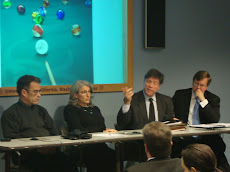As noted here and elsewhere, the IOM workshop report acknowledges, with my comments in parentheses:
- how long the incubation period may last is unknown (40 days have been documented)
- how long Ebola virus stays infectious on surfaces is unknown (depends on the surface and ambient conditions but days would not be unusual)
- how to effectively kill it is unclear (the time during which the antiseptic must be in contact with virus is crucial and often prolonged)
- the best PPE has not been established
- whether Ebola can be transmitted before symptoms start is unknown (several cites suggest it can)
- its potential to be aerosolized is uncertain (in other words, how far an aerosol may spread and how likely it is to cause infection are uncertain)
- whether livestock or pets can be intermediate hosts is unknown, nor whether they may act as fomites to facilitate transmission via aerosol droplets
The current PPE works. Now it needs to be made usable for more than 40 minutes, through some form of safe ventilation. I suspect this could be accomplished with the positive pressure suits worn in BL-4 labs. Yes, it requires a lot of technology for Africa. But with billions now being pledged for the fight, I think the money is sufficient to build western-style hospital units for Ebola patients. We need to move beyond the plastic tents as a precondition to improving the dismal case fatality rates. Only then will isolation and contact tracing be effective; only then will all victims be willing to identify themselves and seek treatment.










No comments:
Post a Comment